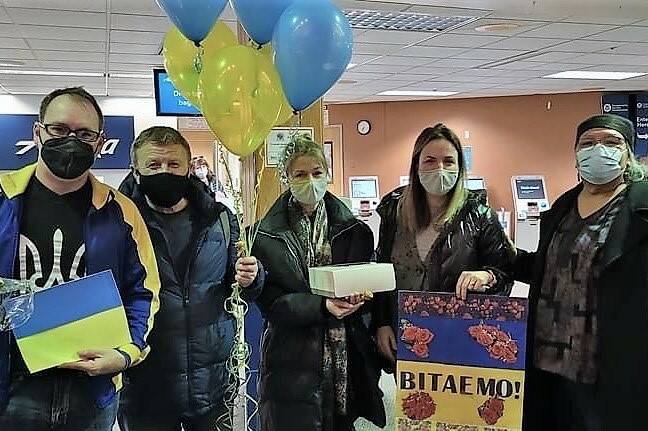When Dasha Pearson moved to Sitka in 2017, she knew she wanted her family back in Ukraine to be able to visit her, so they started applying for visas to the U.S. It was lucky they did, because when Russia invaded the country in February, millions of Ukrainians fled their homes, and sought refuge abroad.
“When it started I begged them to come here,” Pearson said of her father and sister, who were still in the northeastern city of Kharkiv. “We told them, ‘Go to Poland, we’re going to get you tickets to come here.’”
Pearson’s sister Natalia Dontsova, 45, and her father Alexander Dontsov, 73, arrived safely in Seattle in early March and have been living with her in Sitka, but their tourist visas expire in September. The Department of Homeland Security has offered Temporary Protected Status to Ukrainian nationals residing in the U.S. since April 11, and Pearson’s family may be eligible.
The Biden Administration announced over $1 billion in humanitarian aid for Ukraine and said the U.S. would accept up to 100,000 Ukrainians through “a range of legal pathways” including refugee status. The United Nations High Commission on Refugees estimates that 5.7 million Ukrainian refugees have fled the country since Feb. 24, 2022, with more than 3 million going to Poland.
If they’re able to get the status, Pearson’s family may also be eligible for work permits, something she said her sister is eager for.
“We are lucky that we can have them here,” Pearson said. “But everybody wants to do something even to distract themselves, to do something with their life.”
[Lawmakers confirm Dunleavy appointees, work on PFD]
The uncertainty around the war is difficult, Pearson said. No one knows how long the war will last and Pearson said she has friends that are still in Ukraine. Pearson is from Kharkiv — Ukraine’s second-largest city which has seen heavy fighting — and she and her family have been following the situation closely.
Pearson said her family hopes to return to Ukraine someday, but they’re unsure when that will be.
“We’re just checking in, and checking the news, and checking Facebook. This is what our lives look like,” Pearson said.
Pearson said her family is lucky to have been able to get out, but there are millions of Ukrainians in Europe and other countries that are seeking entrance to the U.S. and other countries. But the process can be onerous, there are many types of visas and applying for refugee status is handled by a network of agencies in multiple countries and often the U.N. Refugee Agency.
But refugees need sponsors, Pearson said, and finding one can add to the difficulty. A friend was able to reach out on Facebook and find sponsorship in Texas, where there’s a large Ukrainian population, Pearson said. But that friend was having the same trouble with not being able to work. Communities are warmly welcoming Ukrainians, Pearson said, and they’re grateful, but once they’re here many find themselves with little to do but think about the war.
Pearson said refugees want to work to feel useful and not have to depend on others, but also to distract themselves.
“It’s really nice,” Pearson said. “But at some point, you just need to do it on your own.”
In April, President Joe Biden announced a streamlined process for accepting Ukrainians fleeing the war called Uniting for Ukraine, but the requirements are still stringent. According to Homeland Security, Ukrainians must “have a sponsor in the United States, complete vaccinations and other public health requirements and pass rigorous biometric and biographic screening and vetting security checks.”
People and organizations seeking to sponsor Ukrainian citizens will be required to declare their financial support and pass security background checks to protect against exploitation and abuse, according to the Department of Homeland Security.
An Anchorage church set up a new program — the Ukrainian Relief Program — to help settle displaced Ukrainians in Alaska, and Gov. Mike Dunleavy issued a proclamation in March saying his administration was ready to work with such organizations to facilitate the expedited settlement of refugees in the state.
The program’s director Zori Opanasevych told the Empire she’d helped resettle about 50 displaced Ukrainians since the program started. Opanasevych said the people she was helping were not those who have applied for refugee status, but Ukrainians who had arrived in the U.S. through a variety of other means and granted what’s called humanitarian parole.
Humanitarian parole is granted to those with a compelling emergency need to enter the U.S., according to U.S. Citizenship and Immigration Services. Opanasevych said the Uniting for Ukraine streamline was helpful in getting people verified for the program.
“It’s doable but it’s pretty rigorous,” Opanasevych said of the process.
Most of the Ukrainians Opanasevych has helped so far have had family in the U.S., she said, and once granted, humanitarian parole also allows people to legally work.
“I have employers calling me and saying, ‘I’m ready to hire them,’” Opanasevych said.
The program is looking to bring more Ukrainians to Alaska, and has gone so far as to charter a commercial airliner to fly them directly from Poland to Anchorage. Opanasevych said a commercial airline, which has asked to remain anonymous for the time being, has offered “a humanitarian price” for the flights, asking only for the cost to cover fuel for the flight.
The program is trying to raise $700,000 for multiple flights and Opanasevych said they hope to charter up to three round-trip flights. The program is also raising money for supplies to send to Ukraine, specifically to areas where people have been unable to evacuate, according to Opanasevych.
“They will help us by working, we will help them by giving them a safe place,” Opanasevych said. “The people who do choose to stay, to make America a more permanent home, they can apply for that legal status but that’s a different path.”
Contact reporter Peter Segall at psegall@juneauempire.com. Follow him on Twitter at @SegallJnuEmpire.

